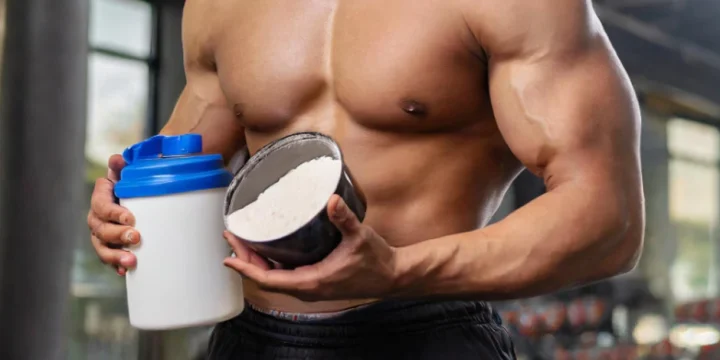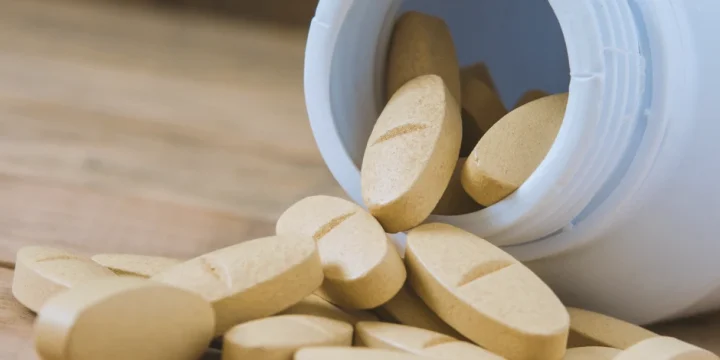As a medical doctor, I know that for most people, creatine is the number one go-to supplement for increasing muscle growth and improving workout performance.
Fortunately, you don't have to rely on creatine supplementation alone to gain its benefits and achieve peak physical performance.
What are these alternatives, and how can they transform your fitness regimen?
Keep reading to discover these top alternatives that may not only equal but also exceed the benefits of creatine.
Quick Summary
- Creatine alternatives for muscle building are branched-chain amino acids, whey protein, hydroxymethylbutyrate, caffeine, beta-alanine, and nitric oxide.
- Creatine powder adds additional energy to your body, allowing you to undergo intense workouts without getting tired faster.
- A study on the National Center for Biotechnology Information website found that hydroxymethylbutyrate (HMB) and creatine significantly increased lean mass and strength gains with resistance training, particularly in beginner weight lifters.
- From a medical standpoint, exploring creatine alternatives is beneficial, especially for patients who may have contraindications to creatine or are seeking more natural supplementation options.
Are There Effective Alternatives To Creatine?

Yes, there are effective alternatives to creatine supplements. However, no supplement can completely match what it can do for your body, but some come close to mimicking its effects.
I’ll talk more about why you might need creatine alternatives below, but based on our research, here are some effective substitutes you can use.
Products such as branched-chain amino acids (BCAAs) and whey protein and seafood can provide you with one or more of creatine’s numerous benefits.
Best Supplement Alternatives To Creatine
If you’re a fairly active person, the 1 to 2 grams of creatine that your body makes each day won’t be enough to supply all the energy that your muscle cells need.
This is why some athletes and bodybuilders rely on creatine supplementation to enhance their physical performance and muscle mass gains.
But if you’re still on the fence about taking creatine, you should consider trying out one or more of these highly effective substitutes.
Related Creatine Articles:
Muscle-Building Creatine Substitutes

Branched Chain Amino Acids
If you’ve heard of BCAAs before but haven’t given them a shot, why not consider it now? maybe it’s time that you add them to your daily diet.
Amino acids develop protein blocks in your body, and BCAAs (leucine, isoleucine, valine) are part of that.
Like creatine, BCAAs may help increase muscle growth, decrease muscle soreness after an exercise, reduce workout fatigue, and prevent muscle breakdown [1].
Whey Protein
Whey protein is one of the most popular muscle building supplements in the sports nutrition world today. According to the study found on the National Center for Biotechnology Information website, it can help you build muscle and enhance recovery when taken in combination with resistance exercise [2].
If you’re doing weight lifting or high-intensity training to get swole, you also need to up your intake of high-quality, lean protein to increase your body’s muscle-building capacity.
However, meeting your daily protein needs from solid food alone can be difficult, especially if you have a busy lifestyle. The good thing is that protein powder is readily available, cheap, and tastes great, depending on what brand you choose.
Hydroxymethylbutyrate (HMB)
This chemical is created in the human body when it breaks down the BCAA called leucine.
A study found on the PubMed website suggests that HMB and creatine significantly increased lean mass and strength gains with resistance training [3].
However, HMB’s effects were observed in beginner weight lifters only. For some reason, it doesn’t work on experienced strength trainers.
Also, its muscle growing effect diminishes after a novice has been lifting weights for several months.
Performance Enhancing Creatine Substitutes

Caffeine
Whether you're an elite athlete or a fitness neophyte weightlifter, taking caffeine can positively affect your exercise performance, boosting your energy and focus.
But if you’re an avid consumer of coffee, energy drinks, soda, or dark chocolate, you may experience diminished benefits from caffeine because your body has developed a tolerance to it [4].
So if you wish to use caffeine for enhanced athletic performance, you better save it for key events to maximize its benefits. Take it about 60 minutes before a race or event, and you’re good to go.
Carbohydrates
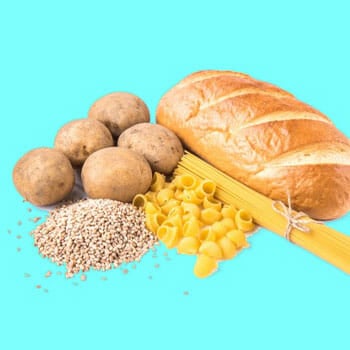
Carbohydrates are the fuel that aids the proper functioning of your body and brain.
Carbs can also help you reach peak performance during physical activity because, like creatine, they provide energy and maximize muscle gain.
You need to consume carbs before and during exercise if you will be working out for more than an hour.
Post-exercise, you must eat carbs to replenish energy stores in your body, especially after an intense workout MedlinePlus.gov reports [5].
If you trained for over 90 minutes, it’s best to eat carbs, possibly with protein (like a sports bar, trail mix with nuts, yogurt, or granola), at least two hours later.
Water and Sports Drinks
Drinking water may seem like a no-brainer, but some people tend to undermine the impact of hydration on physical performance, often overlooking its essential role.
During exercise, the body maintains its optimal temperature by sweating, resulting in a loss of body fluid. This loss also increases with the rise in ambient temperature and increase in exercise intensity.
That’s why drinking fluids during physical activity is necessary to replace all these lost fluids. Doing so will lessen the risk of heat stress, maintain normal muscle function, regulate your blood pressure, and prevent reduced performance brought about by dehydration [6].
"Staying hydrated increases energy, improves movement, recovery and agility, thermoregulation, and aids in mental clarity and activity – all of which can improve physical performance and reduce the risk of injuries.”
- Brittany Wehrle, Performance Dietitian
Beta-Alanine
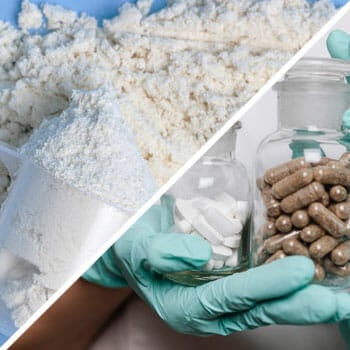
Beta-alanine is a naturally occurring amino acid that protects your muscles during high-intensity exercise.
According to a study from Sports Nutrition, when you consume beta-alanine at a much higher dose than what you get from your body or food, it can improve your performance on short term bursts of high-intensity activities such as sprinting and weight lifting [7].
Beta-alanine can also delay muscle fatigue, elevate short-term muscle power, and improve sustained power output time, making it a great alternative to creatine.
Nitric Oxide
One of the things that make creatine so popular among athletes is its ability to supercharge energy production for the muscles.
Another substance that can give you similar results is nitric oxide. These supplements don’t actually have nitric oxide in them; they just contain compounds that your body can use to produce nitric oxide.
Nitric oxide can widen your blood vessels, which helps increase the delivery of nutrients and oxygen to the muscles you use during exercise [8].
Creatine Overview

Creatine monohydrate is an amino acid naturally produced in the kidneys, pancreas, and liver [9].
It's responsible for producing adenosine triphosphate, which is the primary energy source of your muscles. When you undergo intense exercise, the ATP stored in your muscle cells gets depleted within the first few seconds, and so does your energy.
More creatine means more ATP, so those who often engage in resistance training or weight training will definitely need more of it.
There is strong evidence proving creatine's efficacy in improving exercise performance and building muscle mass during strength training [10]. This makes creatine monohydrate one of the most-consumed sports supplements.
Long-term creatine supplementation by healthy individuals—even with very high dosing of 30 grams daily—has never caused any adverse side effects, proving that it’s 100% safe.
Why You Should Avoid Taking It?
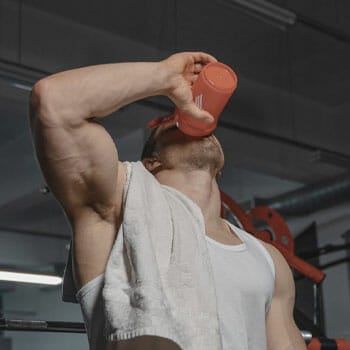
You should avoid taking creatine if you believe you can get it from food or are wary about using muscle-building products, or if you prefer natural alternatives.
Despite its proven benefits, it doesn’t mean that everyone should take creatine supplements.
Creatine isn’t necessary to achieve your strength and muscle-building goals; it just helps you reach them faster.
Dietary Support for Natural Creatine Production
Beyond supplements, our diet plays a pivotal role in the natural production of creatine.
The body synthesizes creatine from amino acids like arginine, glycine, and methionine. Consuming foods rich in these amino acids can bolster our body's creatine levels.
For instance, fish, meat, and dairy products are excellent sources.
By ensuring a balanced intake of these foods, one can support muscle energy without relying solely on supplements.
Best Food Sources Of Natural Creatine

Here are foods high in creatine that you should add to your diet.
Red Meat
Aside from being a rich source of natural creatine, this one is also packed with high-quality protein, vitamins, and minerals. Beef, pork, and sheep all fall under this category.
Beef, particularly steak, has a high amount of creatine. So if you want a boost in energy and muscle health, this is a great food choice to add to your diet.
Chicken
Chicken is an excellent source of lean meat, which is high in protein and creatine [11]. It’s also healthier than red meat since the creatine in chicken has low levels of saturated fat.
Pork
Pork is another great creatine supplement alternative that is also rich in protein. Research from the International Journal of Environmental Research and Public Health has proven it improves strength, increases lean muscle mass, and help muscle recovery during and after exercise [12].
The high creatine content of pork makes it an ideal choice for bodybuilders and recovering athletes looking to build muscle and repair them.
Salmon
Eating salmon is another excellent option for people who want to increase their creatine supplementation.
This oily fish is low in calories and contains high amounts of creatine, protein, and omega 3 fatty acids. Like creatine, it can help you maintain muscle mass and supply energy where it is needed.
Tip: Choose wild salmon as it contains more vitamins and creatine.
Tuna
This saltwater fish is another good creatine alternative that you should add to your diet. Tuna is also a rich source of Vitamin B6, cobalamin, and magnesium.
FAQs
What Is Buffered Creatine?
Buffered creatine is a type of creatine supplement that is chemically modified to have a higher pH (alkaline) than standard creatine monohydrate. The idea behind buffered creatine is that it may be more stable in liquid and less likely to convert into creatinine, a less bioavailable form of creatine, in the acidic environment of the stomach.
Why Don't Doctors Recommend Creatine?
Doctors may not routinely recommend creatine because it is not generally necessary for most healthy individuals, and there may be limited research on its use in various medical conditions or populations.
References:
- https://www.healthline.com/nutrition/benefits-of-bcaa
- https://www.ncbi.nlm.nih.gov/pmc/articles/PMC5537849/
- https://pubmed.ncbi.nlm.nih.gov/12433852/
- https://pubmed.ncbi.nlm.nih.gov/12235019/
- https://medlineplus.gov/ency/article/002458.htm
- https://www.sportsdietitians.com.au/wp-content/uploads/2015/04/Fluids-in-sport.pdf
- https://www.ncbi.nlm.nih.gov/pmc/articles/PMC3257613/
- https://www.healthline.com/nutrition/nitric-oxide-supplements
- https://www.healthline.com/nutrition/too-much-creatine#what-it-is
- https://www.ncbi.nlm.nih.gov/pmc/articles/PMC3407788/
- https://www.ncbi.nlm.nih.gov/books/NBK209321/
- https://www.ncbi.nlm.nih.gov/pmc/articles/PMC7246861/
About The Author
You May Also Like



